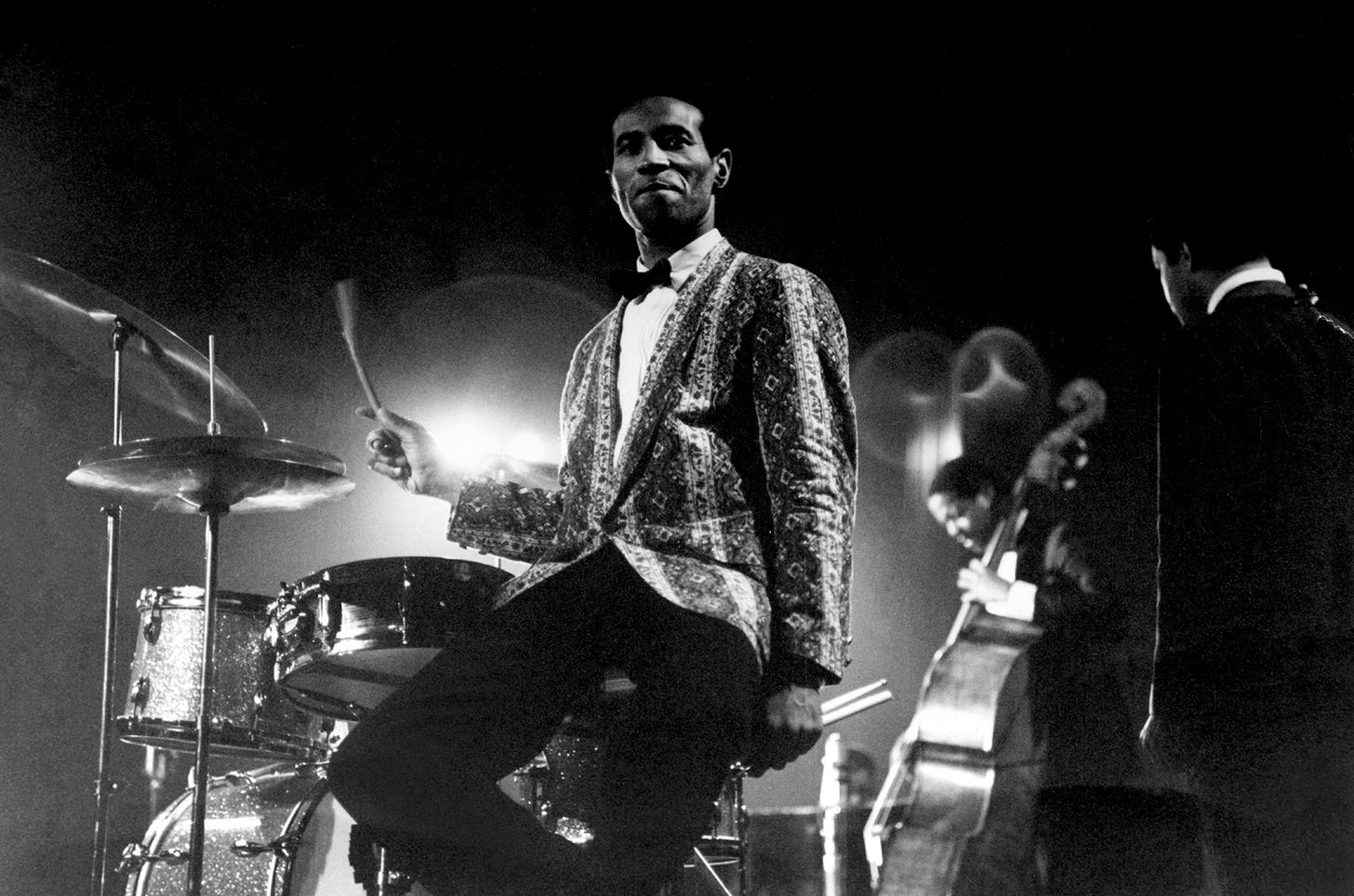Reviews of four new documentaries, on two music legends and two strange dudes
On ‘Max Roach: The Drum Also Waltzes,’ ‘Joan Baez: I Am a Noise,’ 'Mister Organ,’ and ‘Uncharitable’
Most weeks, I’ll review a new documentary here in the newsletter. This week, I’m reviewing four of them. All are out this week, unless where noted.
Max Roach: The Drum Also Waltzes
Max Roach may not be a household name to non-jazz people, but he was a very significant figure in American music, a man with a long career whose life took several different turns.
Born in 1924 in South Carolina, Roach helped to pioneer the “bebop” musical style and was also a composer of note, writing the “Freedom Suite.” He also spent time as an activist in the 1960s.
Directed by the very prolific Sam Pollard along with Ben Shapiro — no, not that Ben Shapiro — the Drum Also Waltzes documentary is propulsive and fascinating, featuring plenty of Roach’s music. The backstory is even more compelling- both Pollard and Shapiro started Roach documentaries decades ago, abandoned them, and then combined forces to complete a single film.
The main talking heads are Roach’s son and daughter, but the film offers plenty of archival footage of Roach, who died in 2007 at age 83, both speaking and performing. Also heard from are Questlove, the since-deceased music journalist Greg Tate, and early MTV mainstay Fab 5 Freddy, who happens to be Roach’s godson.
The Drum Also Waltzes, which debuted at South by Southwest and then showed outdoors this past summer in Philadelphia as part of CineSpeak’s movie series, debuted this week on PBS’ American Masters series. You can watch it on your local PBS station, on the PBS Roku app, and even on PBS’ website right here.
Joan Baez: I Am a Noise
This film, out theatrically this week in some cities, follows another musical icon of the 20th century who spent some time on the political side of the 1960s counterculture.
The folk legend Joan Baez, though, is still alive and continuing to perform in her 80s. I Am a Noise, from the filmmaking trio of Miri Navasky, Maeve O’Boyle, and Karen O’Connor, cuts back and forth between Baez going back out on a performing tour, and telling her life story.
This includes everything from her diaries to her sessions with a therapist, which appear to resemble the controversial practice known as recovered-memory therapy- which surfaces memories of child abuse.
There’s talk of Baez’s time with Bob Dylan, although it leaves out her early-1980s dalliance with Steve Jobs.
The doc is a bit uneven, but it ends very well, with Baez singing the old folk standard “Fare Thee Well” (Dink’s Song), well-remembered from Inside Llewyn Davis.
Mister Organ
One of the weirdest documentaries of the decade was Tickled, a 2016 nonfiction film out of New Zealand from filmmakers David Farrier and Dylan Reeve. The film explored a strange “sport” known as competitive tickling, the online videos that had circulated depicting that practice, and the filmmakers seeking to get to the bottom of what that was all about.
Now, Farrier has returned with a follow-up, another New Zealand-based exploration of weird behavior. However, this time it’s centered around the cats of a specific guy, the titular Michael Organ.
Organ is a business owner known for over-aggressive “car-clamping,” and Farrier’s attempts to get to the bottom of exactly what was happening, and following the story in some extremely wild directions (the press copy describes Mister Organ as a “narcissist nightmare doc.”)
Mister Organ is not quite as weird as Tickled, but it’s still on a strange wavelength that I respected- and it reminded me a lot of Paul T. Goldman, the Peacock miniseries from earlier this year. That said, I appreciated that it’s a 96-minute documentary and not a seven-part streaming series.
Uncharitable
Here’s one of my least favorite types of documentaries: A rich guy with a particular and esoteric axe to grind who decided the thing to do was to make a documentary about it.
In this case, it’s Dan Pallotta, a former nonprofit executive who previously both wrote a book and gave a TED Talk on the topic of charities. His beef: The people who complain about charities having too much “overhead” are dead wrong, because it’s bad for charities to not be able to pay their executives whatever they want, and spend whatever they want on marketing and whatnot.
The argument amounts to a nonprofit answer to supply-side economics, and that the world is way too mean to the CEOs of charities.
The documentary was directed by Stephen Gyllenhaal, the father of Jake and Maggie, and includes some compelling exploration of Pallotta’s life story.
But his arguments about charity are less convincing. The potential counterargument — that a lot of the functions of charities, especially the ones involving starving children and curing of diseases, could be done by the government instead of relying on the kindnesses of philanthropists — is not even entertained by the film.
It even ends, just like Sound of Freedom did, with the subject appearing on camera to make a direct appeal for people to buy out theaters to show the movie, as well as an unearned invocation of Martin Luther King. (Max Roach did it much better.)
No great documentary has ever been adapted from a TED Talk, and with Uncharitable, that streak has continued.




